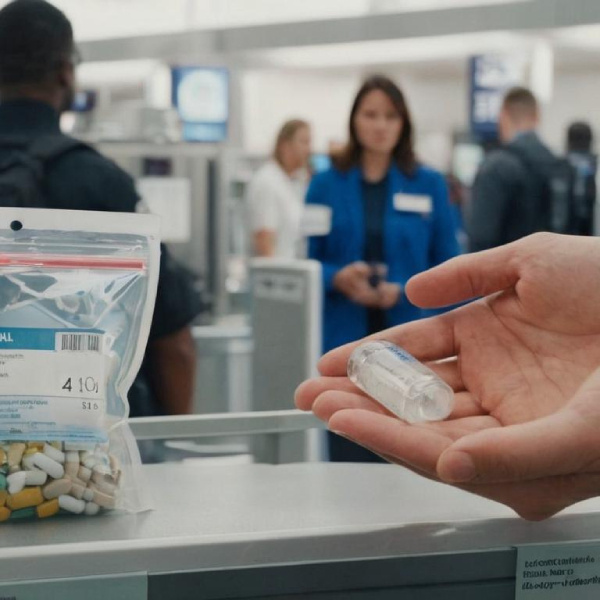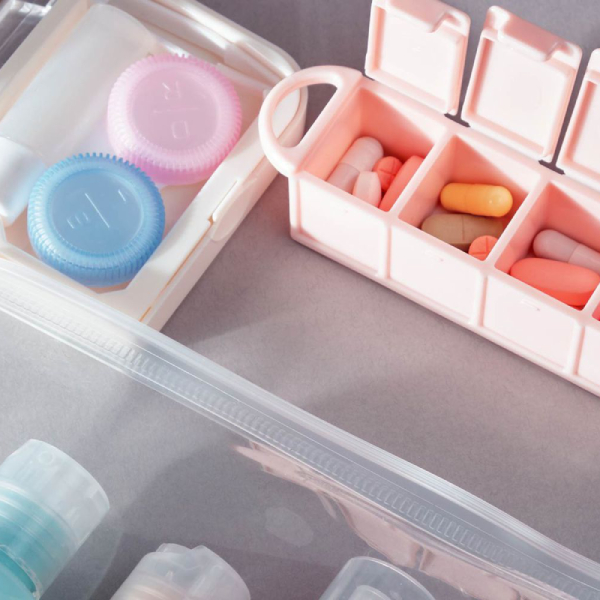Preparing Medication for Air Travel
When you’re flying, managing your medication intelligently is crucial. Here’s how to prepare your meds for a flight. When you travel, it’s essential to know how to carry medication on a plane effectively, ensuring you have everything organized to maintain your health during the flight.

Best Practices for Packing Pills and Meds
- Use a Carry-On: Always pack medication in your carry-on. This avoids loss and accessibility issues.
- Pill Case Advantage: Opt for a pill case to keep meds organized and within easy reach.
- Stay Informed: Be aware of flight delays. Keeping meds close ensures you have them when needed.
- Maintain a Med List: Hold a list of your pills. It’s good practice in case of inquiries.
Considerations for Liquid and Refrigerated Medications
- Observe Liquid Limits: Carry liquids in 3.4 ounces or smaller containers for screening.
- Declare Med Liquids: Tell the TSA officer about your liquid medication before screening starts.
- Use Ice Packs: Ice packs are permitted for cooling medication but declare them at security.
Travel with medications requires planning, but with these guidelines, you can fly without worry.
TSA Screening Procedures for Medication
Navigating TSA screening for medications can be straightforward when you know the process.
X-ray Screening vs. Visual Inspection Options
TSA typically uses X-ray to check medications. But, if you prefer, you can ask for a visual check instead. Request this before your meds enter the X-ray. Remember, there’s no limit to the number of pills you can carry, as long as they’re screened.
What to Do with Liquid Medications at Security Checkpoints
For liquid meds, keep them within the 3.4-ounce limit. Tell the TSA officer about them before screening. If needed, ice packs to cool meds are okay but must be declared.
Regulations for Traveling with Medication
Navigating through TSA checkpoints with medication requires understanding and adhering to specific guidelines. To ensure a smooth journey, be aware of both TSA regulations and the local laws of your destination.
Understanding TSA Guidelines vs. Local Laws
TSA guidelines allow for all forms of medication in both carry-on and checked luggage. If medication is in pill form, you don’t have to keep it in its original bottle. But, keep in mind the regulations of your arrival destination. Some places have strict laws. They may demand medication be in its prescription bottle. Check the rules of the country you’re visiting to avoid issues. When traveling with a backpack, keep in mind that it is a carry-on, and you should ensure your medication complies with TSA guidelines and the regulations of your destination. Being aware of these rules will help you avoid any potential issues during your journey.
Traveling within the United States usually has fewer complications. Just pack your meds according to TSA rules. But when heading overseas, you should be more careful. Research and follow the laws of the foreign country.
Carrying Medications in Original Bottles and Prescription Documentation

Though not required by TSA, there are good reasons to carry meds in original bottles. It helps identify them easily. This is useful during customs checks and in case of emergencies.
Keep in mind that some countries may require a doctor’s note for your prescriptions. The note should explain the need for the meds. This is particularly true for narcotics or psychotropic drugs. For international travel, consider getting the note translated. This can help smooth the process at your destination. When traveling internationally, ensure you have a doctor’s note for your prescriptions, especially for controlled substances, just as you would keep your pioneer wallet safe and organized for easy access to important documents.
While TSA regulations give you some flexibility, local laws can be strict. Plan ahead. Have all necessary documents for a trouble-free travel experience with your medications.
International Travel with Medications
Navigating international travel with medications adds an extra layer of planning to your trip.
Researching Destination Country’s Medication Laws
Before jetting off, it’s smart to look into your destination’s medication laws. Countries have varied rules and it’s key to know them to avoid travel hiccups. Quick research can tell you if you need meds in original bottles or if a doctor’s note is needed for entry. Familiarize yourself with controlled substance regulations—they can be strict. Doing this homework helps ensure that the medications you depend on don’t become a legal issue abroad. Before traveling, ensure your black leather wallet contains not only your travel documents but also any necessary medical paperwork, like prescriptions or a doctor’s note, to comply with the medication laws of your destination.
Handling Controlled Substances and Carrying Doctor’s Notes
If you take any controlled substances, be extra cautious. Some countries have tight rules on narcotics or psychotropics. Always carry these meds in their original containers. Also, consider a doctor’s note that explains your need for the medicine. Translation of this note into the local language can greatly smooth your way. Remember, it’s not just TSA rules you’re navigating—it’s the laws of the land where you’ll land. Be well-prepared, and you can travel with peace of mind. When you plan to carry medication on a plane, always ensure you are informed about the regulations of your destination regarding controlled substances, and keep your meds in their original containers to avoid any legal issues.
Technology Aids for Medication Management During Travel
Keeping track of medications can be tough while traveling. Technology offers tools that are quite helpful.
Using Apps to Manage and Track Medication
Apps can simplify medication management. They let you list your meds and schedules. You can set reminders, so you never miss a dose. If TSA asks, show them the list right from your phone.
Some apps, like Hero, are designed for these situations. They keep the names and dosages of meds handy. Updating your list is easy, keeping your info current.
The Benefits of a Smart Dispenser with Vacation Mode
A smart dispenser is a high-tech pillbox. It gives the right dose when it’s time.
The Hero dispenser is one example. It has a Vacation Mode for trips. Dispense ahead of time, and the app tracks your doses while away. No stress about missed meds, and no resetting needed when home. When traveling, it’s essential to consider how to carry medication on a plane, and options like the Hero dispenser can ease the burden by ensuring you don’t miss doses even while on vacation.
Getting Assistance and Further Information
Traveling with medication can bring up questions. It’s vital to know where to find reliable help and information.

TSA Helpline for Travelers with Medications
When in doubt, reach out to the TSA helpline. It’s designed for travelers with medical conditions or disabilities. Dial (855) 787-2227 at least 72 hours before your flight. Operators are available on weekdays from 8 a.m. to 11 p.m. ET. Weekends and holidays, they are on from 9 a.m. to 8 p.m. ET. They will guide you through the process and address your needs. If you need to carry medication on a plane, don’t hesitate to contact the TSA helpline for assistance, especially if you have medical conditions or disabilities. They can help ensure a smooth travel experience tailored to your needs.
Final Tips for a Hassle-Free Journey with Medications
For a smooth trip, keep these tips in mind:
- Stay Organized: Keep medications in your carry-on. Use a pill case to stay sorted.
- Know Your Meds: Be ready to explain any medication to TSA if asked. Have a list ready.
- Check Rules: Before you fly, research your destination’s laws on medication.
- Get Documents: If you carry controlled substances, bring a doctor’s note and check if you need it translated.
- Use Technology: Download apps to manage your meds. They keep you on track and provide proof if needed.
Plan ahead and keep things simple. This way, flying with medication becomes worry-free.